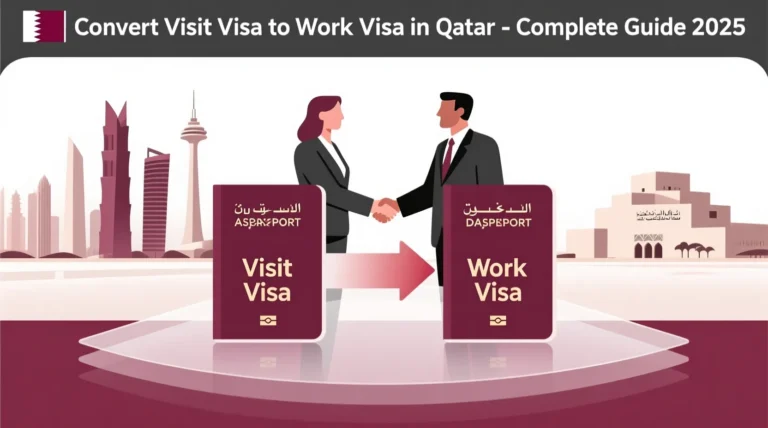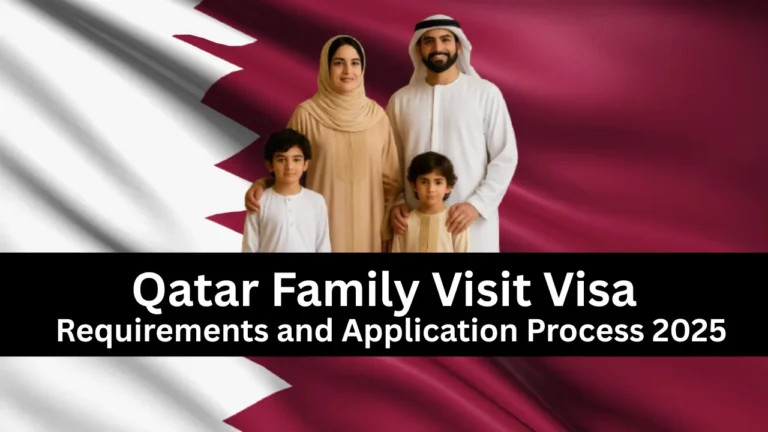Retiring in Qatar is becoming a real choice for many expats who have lived and worked in the country for years. With its modern healthcare, safe environment, and tax-free income system, Qatar offers a lifestyle that is both secure and comfortable. There are different Qatar Visa types as well as the government has introduced the Qatar Retirement Visa to make it easier for foreign residents to stay long-term after leaving their jobs. This program is not just about extending residency; it is designed to support retirees with financial stability, access to quality services, and the chance to continue enjoying life in one of the Gulf’s most developed nations.
Understanding the Qatar Retirement Visa
The Qatar Retirement Visa is a special residence permit designed for foreign nationals who wish to spend their post-employment years in the country. Unlike a work visa or family residence permit, this visa is focused on long-term stay for individuals who are no longer part of the labor market. The program was introduced by the Qatari government as part of its broader strategy to attract foreign investment and skilled expatriates who have contributed to the economy.

What makes this visa unique is its focus on financial stability and social contribution. Retirees are expected to meet certain income or savings requirements, which ensures that they can support themselves without becoming dependent on the state. In return, Qatar provides them with the security of legal residency, access to modern healthcare, and the opportunity to remain close to the communities they have built during their working years.
This initiative also fits within Qatar’s vision to diversify its population base while maintaining a stable and secure environment. For many expats, the retirement visa bridges the gap between finishing a career and continuing to enjoy the benefits of life in a country known for its world-class infrastructure, cultural richness, and global connectivity.
Eligibility Criteria for Qatar Retirement Visa
The Qatar Retirement Visa is not open to everyone. It is carefully designed for a specific group of people who meet the government’s conditions. The first requirement is age. Applicants must usually be at least 55 years old, as the visa is meant for individuals who are no longer in active employment. This ensures that the program truly supports people at the retirement stage of life.

Another important condition is financial stability. Qatar asks retirees to prove that they have a steady monthly income or sufficient savings to cover their living expenses. This income can come from pensions, investments, or long-term savings. In some cases, owning property in Qatar can also support the application, as it shows a deeper financial link with the country. Bank statements and financial records are often needed to prove this stability.
Health coverage is also a critical requirement. Retirees must have valid health insurance in Qatar to make sure they can access medical services without difficulty. A medical check-up may also be part of the process to confirm the applicant is fit to live in the country.
In addition, many retirees applying for this visa have already spent years working in Qatar. While long-term residence in the past is not always required, having ties with the country, such as employment history or property ownership, often strengthens the application. These criteria show that the retirement visa is built to welcome people who have already contributed to Qatar’s growth and now wish to make it their permanent home after work life.
Benefits of the Retirement Visa in Qatar
Choosing Qatar as a retirement destination comes with clear advantages. The most important benefit is long-term residency. Retirees who qualify for this visa are not limited to short visits or temporary permits. They gain the security of living in Qatar legally for many years, without the stress of frequent renewals or sponsorship issues.

Another major benefit is the ability to sponsor immediate family members. This means a retiree can continue living with a spouse and dependent children under the same roof, keeping family life stable even after leaving employment. For many expats who have built their lives in Doha or other cities, this continuity is a major relief.
Healthcare access is another strong point. Qatar has invested heavily in world-class hospitals and clinics, and retirees with valid health insurance can use these facilities without worry. This is a key reason why many older expats prefer to stay in Qatar rather than move back home after work.
The retirement visa also gives space for financial independence. Holders are often allowed to own property in designated areas, and they benefit from Qatar’s tax-free system, which protects pensions and investments from extra deductions. Compared to many Western countries where retirement income is taxed, this is a huge financial advantage.
When compared with similar schemes in the Gulf region, Qatar’s retirement visa is competitive. The UAE and Bahrain also offer retirement options, but Qatar’s focus on stability, safety, and strong infrastructure makes it stand out. For expats who have lived in Qatar for decades, staying close to familiar communities and cultural ties makes this visa especially meaningful.
Required Documents for Application
Applying for the Qatar Retirement Visa requires careful preparation of documents, as the authorities need clear proof that an applicant meets all conditions. The first and most basic document is a valid passport with sufficient validity, since the visa will be linked to long-term residence. Without a passport that meets international standards, the application cannot move forward.

Financial records are equally important. Applicants must provide evidence of stable income or savings that can support their life in Qatar. This usually includes recent bank statements, proof of pension payments, or investment income details. For retirees who own property in Qatar, title deeds and ownership certificates can also strengthen the case, as they show a direct financial link with the country.
Another essential requirement is health insurance coverage. Applicants need to show that they have an active insurance plan that works in Qatar’s healthcare system. In some cases, a medical test may also be required to confirm that the retiree is in good health and able to live comfortably in the country.
Supporting documents such as photographs, completed application forms, and sometimes a police clearance certificate may also be asked for by the Ministry of Interior. These documents prove identity, good conduct, and readiness to comply with Qatar’s residency laws. By preparing these papers carefully and ensuring they are up to date, applicants reduce delays and improve their chances of receiving approval without complications.
Step-by-Step Application Process
Applying for the Qatar Retirement Visa is a structured process, but it becomes smooth when each step is followed carefully. The first step is to confirm eligibility. Applicants should make sure they meet the age, income, and health requirements before starting, as failing to qualify will lead to rejection.
Once eligibility is clear, the next step is preparing all necessary documents. This includes gathering a valid passport, proof of financial stability, health insurance details, and any property ownership records. Organizing these papers in advance helps avoid delays later in the process.
After the documents are ready, the application can be submitted. In most cases, the Ministry of Interior (MOI) handles retirement visa requests either through its main offices or online portals. Applicants may need to fill out official forms, attach scanned copies of documents, and pay the initial processing fee.
A medical check-up may follow, since Qatar requires all long-term residents to prove they are in good health. This is usually done at government-approved medical centers, and the results are sent directly to the authorities. At the same time, the applicant must ensure that health insurance coverage is active and valid in Qatar.
The final stage is the approval and issuance of the residence permit. Once the MOI verifies the documents, financial records, and medical reports, the retirement visa is granted. Processing times can vary, but applicants should be prepared for several weeks before receiving confirmation. Once approved, the retiree receives a Qatar ID linked to their new residence status, giving them legal rights to live in the country under the retirement program.
Quick Checklist for Retirement Visa Application in Qatar:
- Confirm eligibility (age, income, health).
- Gather required documents.
- Submit application via MOI office or online.
- Complete medical tests.
- Activate valid health insurance.
- Wait for approval and receive Qatar ID.
Costs and Fees
Applying for the Qatar Retirement Visa comes with certain expenses that every applicant should plan for in advance. The first cost usually involves the visa application and processing fee, which is paid directly to the Ministry of Interior at the time of submission. Although the exact fee can change based on government updates, it is typically a fixed amount set for long-term residency permits. Applicants are advised to confirm the latest charges through the official MOI website or service centers before applying.
In addition to the application fee, health insurance is a mandatory expense. Since retirees must show proof of coverage in Qatar, the cost of purchasing or renewing a policy will vary depending on age, health condition, and the insurance provider. This can be one of the larger ongoing costs, as coverage must remain active for the visa to stay valid.
Some applicants may also face expenses related to document preparation, such as translation, attestation, or legal certification of foreign financial and medical records. If property ownership is used to strengthen the application, transfer or registration fees may also apply.
Renewal fees are another factor to consider. The retirement visa is not a one-time process; it needs to be extended after a certain number of years. Each renewal involves a payment to maintain residency status, along with proof that financial and health requirements are still being met. By understanding these costs in advance, retirees can budget effectively and avoid unexpected issues during the application or renewal process.
Challenges and Considerations
While the Qatar Retirement Visa offers many benefits, applicants should also be aware of the challenges that come with it. The first and most common difficulty is meeting the strict financial requirements. Qatar wants to ensure that retirees are financially independent, which means applicants must prove a stable income or significant savings. For some expats, especially those without a pension or large investments, this condition can be hard to satisfy.
Another challenge is the restriction on employment. Retirees under this visa are not allowed to take up full-time work in Qatar. While limited business activities or investments may be possible, those who wish to remain in the workforce will need to explore other visa categories. This limitation makes the retirement visa suitable only for those who are financially secure and do not rely on employment for income.
Healthcare is another consideration. Even though Qatar has excellent medical facilities, retirees must maintain valid health insurance at all times. Premiums can increase with age, making this a significant ongoing expense. Failing to keep insurance active could lead to complications in renewing the visa.
Applicants should also consider the renewal process. The retirement visa is not permanent and requires regular updates to confirm that eligibility criteria are still being met. This means retirees must continue to provide bank statements, insurance documents, and proof of financial stability every few years.
Lastly, awareness of the program is still limited compared to other Gulf countries. Information can sometimes be unclear or scattered across different government portals. This makes professional guidance or direct consultation with the Ministry of Interior important for avoiding mistakes. Understanding these challenges early helps retirees plan better and ensures a smooth transition into life after employment in Qatar.
Alternatives to Retirement Visa in Qatar
Not every expat will qualify for the Qatar Retirement Visa, but this does not mean their options to stay in the country are closed. Qatar has introduced other residency pathways that may suit individuals who want to live in the country after retirement or without formal employment. One of the strongest alternatives is the investor visa. This permit is available to foreigners who make significant financial investments in Qatar, either through business ventures or company shares. It is often chosen by retirees who prefer to remain active in the economy rather than step away completely.
Another pathway is property ownership residency. Foreigners who purchase real estate in designated areas of Qatar may qualify for a residence permit linked to their property. This option has grown popular in recent years, as it allows retirees to secure a home while also gaining long-term residency benefits. The minimum property value requirement is set by the government, and ownership comes with added advantages such as access to public services and commercial facilities.
Family residence permits also serve as an alternative. Retirees who have children or spouses working in Qatar may qualify to stay under family sponsorship. While this option depends on a relative’s active employment in the country, it remains a practical solution for those who do not meet the financial or age requirements of the retirement visa.
When compared to the retirement visa, these alternatives often require different commitments, either financial or personal. However, they provide flexibility and ensure that expats with strong ties to Qatar can continue to enjoy life in the country, even if they do not meet the exact retirement visa criteria. By considering all options, retirees can choose the path that best matches their financial capacity and long-term lifestyle goals.
Final Tips for Applicants
Applying for the Qatar Retirement Visa can feel complex at first, but careful planning makes the process much smoother. The most important step is to start preparing early. Retirees should keep their financial records, bank statements, and insurance documents updated well before they apply. This prevents last-minute delays and helps prove eligibility without stress.
It is also wise to stay informed through official sources. The Ministry of Interior regularly updates its requirements and fees, and relying on old information can lead to mistakes. Checking directly with MOI offices or their online portal ensures that every step is based on accurate and current rules.
Another useful tip is to think long term. The retirement visa requires renewals, so applicants should plan for ongoing expenses such as health insurance premiums and possible renewal fees. Setting aside funds for these costs helps maintain residency without interruptions.
Finally, many expats benefit from seeking advice from immigration consultants or legal experts in Qatar. While it is not required, professional guidance can save time, reduce errors, and provide clarity on special cases like property ownership or joint family applications. By approaching the process with preparation, awareness, and proper advice, retirees can secure their place in Qatar with confidence and peace of mind.
FAQs About Retirement in Qatar
Can foreigners retire in Qatar?
Yes, foreigners can retire in Qatar if they meet the eligibility criteria set by the government. The Qatar Retirement Visa allows expats above a certain age, with stable income or savings and valid health insurance, to live in the country legally after finishing their work life.
Can I work in Qatar after 60 years?
In most cases, employment contracts for expats are limited after the age of 60. While it is possible to continue working with special approvals from the Ministry of Labour, opportunities become limited, and employers must justify the extension. This is why many expats shift to retirement or investment visas after reaching 60.
Is there a retirement visa in Qatar?
Yes, Qatar has introduced a retirement visa that allows eligible expats to stay long-term after employment. The visa is designed for people over 55 who can show financial independence and health insurance coverage.
What is the retirement age in Qatar for expats?
The general retirement age for expats working in Qatar is 60. However, depending on the employer and government approval, some professionals may continue working beyond this age, especially in skilled or specialized roles.
Can I live in Qatar permanently?
Qatar does not offer permanent residency to most foreigners, but long-term residency is possible through programs like the retirement visa, investor visa, or property ownership visa. These permits allow expats to live in the country for many years with renewals.
What’s the easiest country to retire to?
Globally, countries like Portugal, Spain, and Costa Rica are considered some of the easiest for retirement due to flexible visa rules and affordable living. In the Gulf region, both the UAE and Qatar offer structured retirement visa programs for expats.
What is the maximum age limit to work in Qatar?
The maximum working age for most expats in Qatar is 60, though extensions can be granted in special cases. After this age, retirement or alternative residency programs are the usual options.
Which country has the best retirement age?
Retirement ages vary worldwide. European countries like France and Italy set retirement ages between 62 and 67, while Gulf states such as Qatar and the UAE usually limit expat employment to around 60. The “best” retirement age depends on income stability and lifestyle goals.
How much is the pension in Qatar?
Pensions in Qatar mainly apply to Qatari nationals through government schemes. For expats, pensions usually come from home-country programs or private savings, since Qatar does not provide a state pension for foreign workers. Many retirees rely on pensions, investments, or rental income to qualify for the retirement visa.
Conclusion
Retirement is one of life’s biggest transitions, and choosing where to spend those years can shape both comfort and security. Qatar’s Retirement Visa offers expats a structured way to stay in the country after their working life ends, with benefits such as long-term residency, access to healthcare, and the chance to remain close to familiar communities. While the program has strict eligibility requirements, it provides a reliable pathway for those who have built their lives in Qatar and want to continue enjoying its safety, stability, and modern lifestyle.
The key to a successful application lies in preparation. Retirees must carefully plan their finances, maintain valid health insurance, and stay updated on the latest rules set by the Ministry of Interior. Alternatives such as investor and property visas also provide flexible options for those who may not qualify directly.
For many expats, Qatar is more than a workplace, it becomes home. The retirement visa reflects the country’s growing openness to supporting long-term residents who have contributed to its development. By understanding the process and preparing in advance, retirees can secure a future in Qatar that is not only stable but also rewarding.







